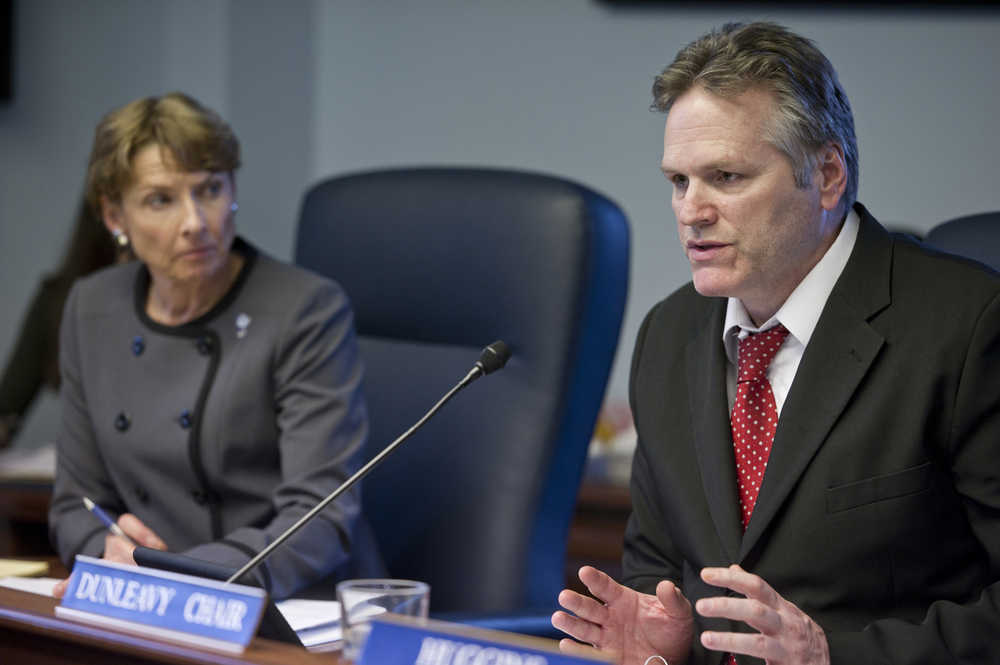A bill that would restrict abortion service providers, like Planned Parenthood, from teaching in public schools has jumped its first hurdle. The Senate Education Committee voted 3-2, passing an amended version of Senate Bill 191 Tuesday afternoon.
Sen. Mike Dunleavy, R-Wasilla, the bill’s sponsor, said the amendment addresses legal issues brought up during public testimony last week and invited testimony Tuesday.
Originally, the bill said “an employee or representative of an abortion services provider or of an affiliate of an abortion services provider may not present or deliver any instruction or program on any topic to students at a public school.” That person also could not distribute or display materials. If violated, the person could be fined at least $5,000.
ACLU of Alaska Executive Director Joshua Decker addressed problems with the bill. He was one of four people invited to testify Tuesday.
“The bill doesn’t discriminate based on content. This bill applies to every topic — from sexual health to President Lincoln to geometry to calculus. This bill unconstitutionally discriminates against people based on who they are, what they say, with whom they associate and how they spend their time in their private lives outside the schoolhouse gates,” Decker said.
Attorney Mario Bird agreed and said the current bill could pose legal challenges. Bird is with Anchorage law firm Ross, Miner & Bird. He’s also a board member of Alaska Right to Life.
Bird said similar legislation passed in Missouri in 2007 and Louisiana in 2014 had key phrases that “would be not only desirable, but has the virtue of not being challenged legally in either Louisiana or Missouri to my knowledge.”
He suggested inserting narrowing language into the bill, which is what Dunleavy’s amendment does.
Instead of any employee or representative of an abortion services provider being restricted from delivering material or instruction, the amendment stipulates that the employee or representative must be “acting on behalf” of an abortion services provider or affiliate in order to violate the law or be fined.
Also, instead of an employee or representative of an abortion services provider being restricted from presenting on any topic, the amendment narrows the prohibited topics to “any health topic, including human sexuality or family planning, to students at a public school during the hours the school is in session.”
Dunleavy’s explanation of the amendment states, “With the proposed amendment, the language would be in line with law in both Louisiana and Missouri.”
Sen. Gary Stevens, R-Kodiak, was one of two no votes on the amended bill. As a former school board member, he said he had concerns with the bill.
“It seems to me there are a lot of protections in our current system. If a parent does not want their child to receive sex education classes, they can opt out. I think this is state overreach into school boards and into parents. I don’t think it’s a good bill,” Stevens said.
The other no vote came from Sen. Berta Gardner, D-Anchorage.
“I don’t see what problem the bill is solving. If you don’t want any talk of abortion in schools, just say so and be done with it,” Gardner said.
“If the issue we’re trying to address directly is abortion, one very good, very effective way to reduce abortion is to reduce the number of unplanned pregnancies, and information on about how things work is of great value in that,” she added.
Senators Cathy Giessel, R-Anchorage, Dunleavy and Charlie Huggins, R-Wasilla, voted yes on the bill.
Dunleavy made clear SB 191 “does not prevent any teacher, any school district from providing sex ed.”
Dunleavy’s bill is now headed to Senate Judiciary Committee, which is chaired by Sen. Lesil McGuire, R-Anchorage.
Planned Parenthood provides instruction in 25 to 30 Alaska schools, according to Lacy Moran, Anchorage-based Alaska education manager for Planned Parenthood of the Great Northwest and Hawaiian Islands.
• Contact reporter Lisa Phu at 523-2246 or lisa.phu@juneauempire.com.

